Roofing Companies Barrhead
Best Roofers in Barrhead
Get multiple Roofing Service quotes for your project today! Compare profiles, reviews, accreditations, portfolio, etc... and choose the best offer.

Newlands Roofing Company Ltd
421 reviews1010 Pollokshaws Road, Glasgow, G41 2AA, GBNewlands Roofing Glasgow is a family-run business with a long history of providing quality roofing services to our loyal clients in Glasgow's Southside and surrounding areas. We pride ourselves on our care for our customers and their properties. We understand that roofing projects can be a big investment. As a family run company with a long history in the Southside of Glasgow, we have a large and loyal customer base in Glasgow South and East Renfrewshire. We offer free, no obligation quotations for all domestic work from small repairs to new roofs. Full roof inspections and reports can be provided at a cost redeemable against any roof work contracted. We are fully insured, registered with the Federation of Master Builders, TrustMark approved and fully VAT registered. You should always ensure that any contractor you use has these assurances. Newlands Roofing have been fixing and replacing roofs in Shawlands, Clarkston, Newlands, Newton Mearns, East Kilbride and surrounding areas for decades and our vans are a familiar sight. We have a loyal customer base in the area.
- Services
- Why Us?
- Accreditations
- Our Team
- Testimonials
- Gallery
Get Quote
Whelan & Gordon Ltd.
4.312 reviews100 Cheapside, London, EC4A 1BD, GBWhelan & Gordon is a firm of Chartered Accountants based in the heart of the City of London. We provide a comprehensive range of accountancy, tax and business advisory services to a wide range of clients, from small businesses to large corporations. Our team of experienced professionals is dedicated to providing our clients with the highest quality service and advice. We are committed to building long-term relationships with our clients and helping them to achieve their business goals. Our services include: Accountancy Tax Business Advisory We are a member of the Institute of Chartered Accountants in England and Wales (ICAEW). We are also regulated by the Financial Conduct Authority (FCA).
- Services
- Why Us?
Get Quote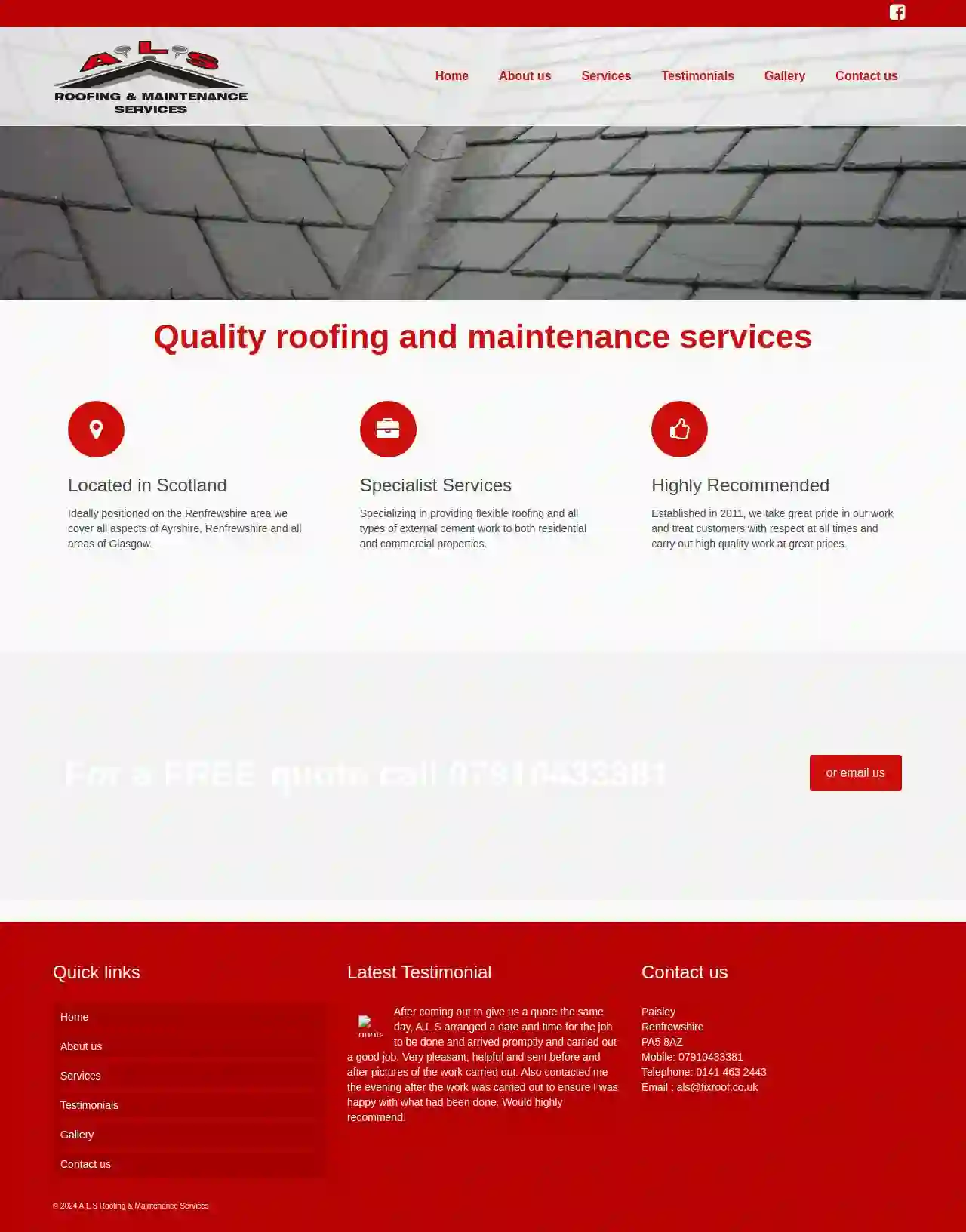
A L S Roofing & Maintenance Services
52 reviewsPaisley, PA5 8AZ, GBQuality roofing and maintenance services Located in ScotlandIdeally positioned on the Renfrewshire area we cover all aspects of Ayrshire, Renfrewshire and all areas of Glasgow.Read More Specialist ServicesSpecializing in providing flexible roofing and all types of external cement work to both residential and commercial properties.Read More Highly RecommendedEstablished in 2011, we take great pride in our work and treat customers with respect at all times and carry out high quality work at great prices.Read More
- Services
- Why Us?
- Our Team
- Testimonials
- Gallery
Get Quote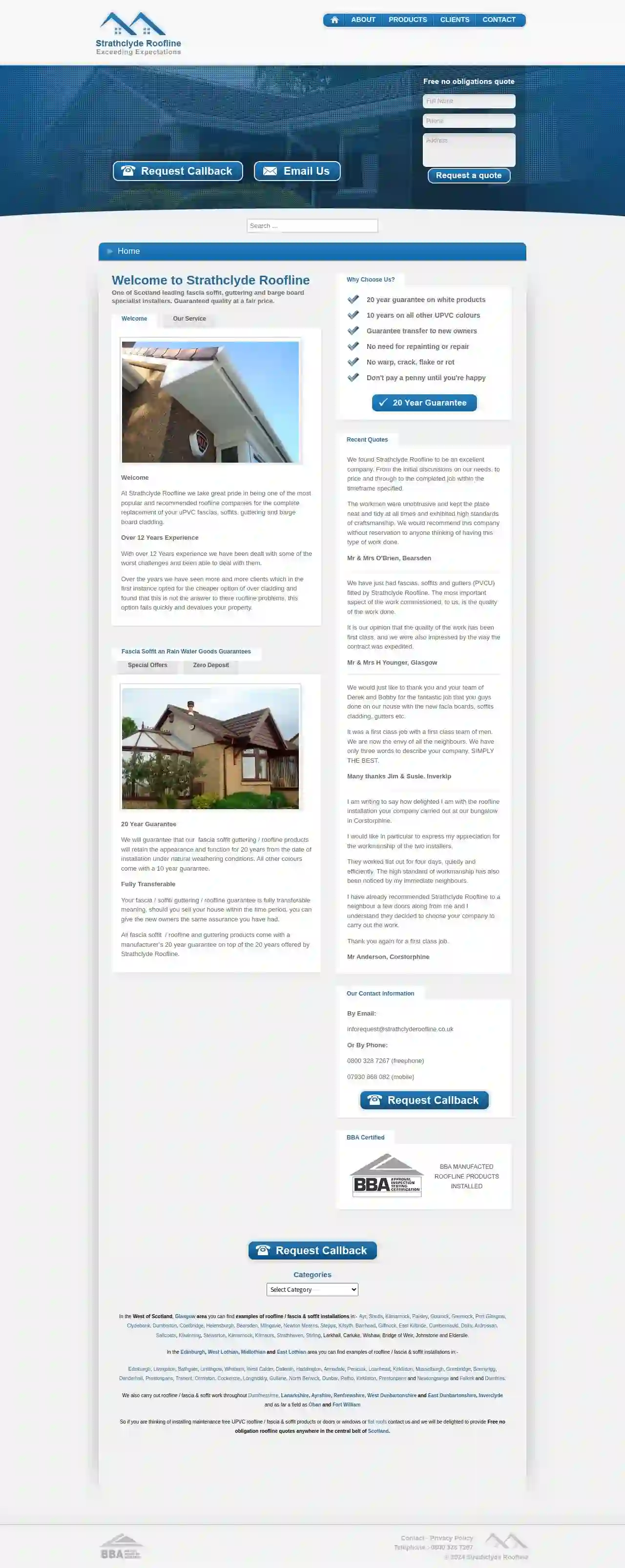
Strathclyde Roofline
4.56 reviewsGlasgow, GBWelcome to Strathclyde Roofline, one of Scotland's leading fascia soffit, guttering and barge board specialist installers. We take great pride in being one of the most popular and recommended roofline companies for the complete replacement of your uPVC fascias, soffits, guttering and cladding. With over 12 years of experience, we have been dealt with some of the worst challenges and been able to deal with them. We believe that the best way to promote and develop our business is to provide the best product and service that we can. We will only install products approved by the British Board of Agrement and Fairtrades. Our team is dedicated to providing a high-quality, maintenance-free uPVC roofline solution that will protect your timber roof rafters from rot and provide a secure fixing for your gutter and support your last row of slates or tiles.
- Services
- Why Us?
- Accreditations
- Gallery
Get Quote
Hearty Roofing
514 reviews22-28 Campsie Road, Torrance, G64 4BN, GBHearty Roofing and Building Ltd offer both commercial and domestic building and roofing services. We work on a variety of projects, from private homes to large-scale projects like schools, football stadiums, hospitals, shopping centres and public buildings. We have a proven track record in delivering the complete range of commercial and domestic building services, offering repairs and maintenance including structural repair, bricklaying / blockwork, general building, roofing, joinery, painting and decoration. We have an extensive client base working with homeowners, housing associations, factors, residential homes, facilities management companies, local authorities, energy companies, mechanical and electrical companies. As a family run business, we understand the importance of building customer trust. We have also been vetted and approved and continue to be monitored by a professionally qualified trading standards officer to help ensure you will receive a quality service. Our technical skills have been independently checked through regular on-site inspection and we have signed up to a code of practice that includes insurance, health and safety and customer care. Our focus is to maintain and develop our customer base using our experience, reliability, honesty and quality. Our reputation relies on our relationship with you.
- Services
- Why Us?
- Testimonials
- Gallery
Get Quote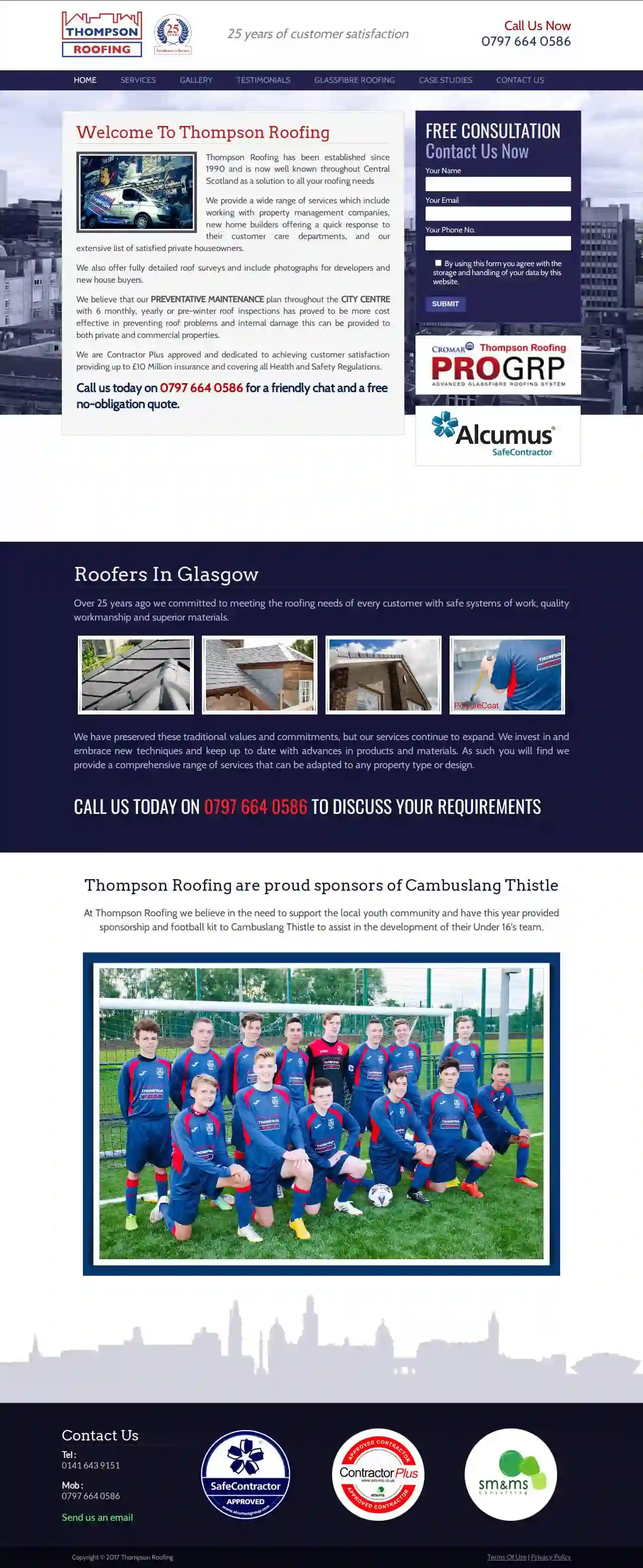
Thompson Roofing
54 reviewsGBThompson Roofing has been established since 1990 and is now well known throughout Central Scotland as a solution to all your roofing needs. We provide a wide range of services which include working with property management companies, new home builders offering a quick response to their customer care departments, and our extensive list of satisfied private houseowners. We also offer fully detailed roof surveys and include photographs for developers and new house buyers. We believe that our PREVENTATIVE MAINTENANCE plan throughout the CITY CENTRE with 6 monthly, yearly or pre-winter roof inspections has proved to be more cost effective in preventing roof problems and internal damage this can be provided to both private and commercial properties. We are Contractor Plus approved and dedicated to achieving customer satisfaction providing up to £10 Million insurance and covering all Health and Safety Regulations.
- Services
- Why Us?
- Gallery
Get Quote
Steadbrook Roofing Ltd
510 reviewsFalkirk, GBHere at Steadbrook, we pride ourselves on going that extra mile to provide an exceptional, world-class service. We have a wealth of experience in the roofing industry, and we are tremendously proud to deliver the highest quality roofing systems to our customers throughout Scotland. Customer satisfaction is at the forefront of our business. We have always been passionate about serving our customers to the highest degree. We ensure this by offering a completely free home visit, where a member of our team will conduct a technical survey and make plans for the implementation of your roofing system. We will conduct a health and safety inspection before any work begins and we aim to carry out our work as efficiently as possible, with a minimal level of disruption.
- Services
- Why Us?
- Testimonials
- Gallery
Get Quote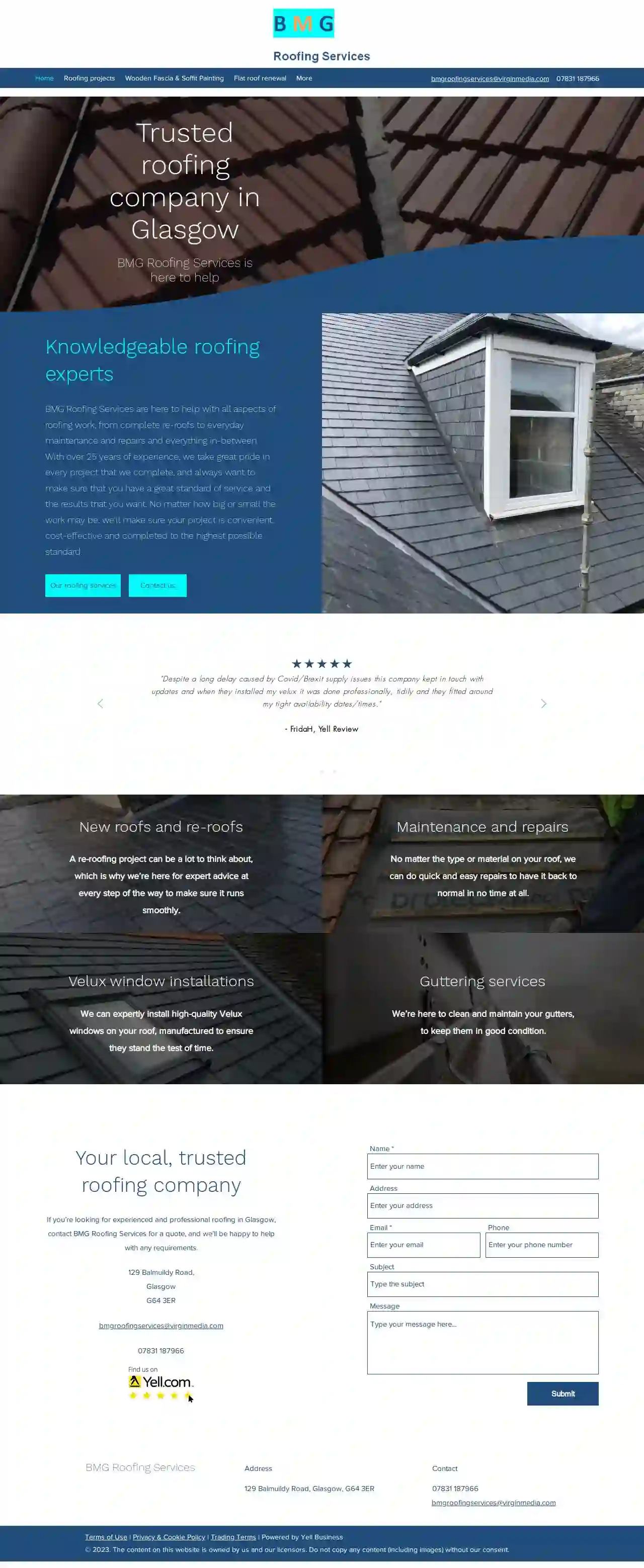
BMG ROOFING SERVICES
513 reviews129 Balmuildy Road, Glasgow, G64 3ER, GBBMG Roofing Services is a trusted roofing company in Glasgow, offering a wide range of services for over 25 years. We pride ourselves on providing expert advice and high-quality workmanship for all your roofing needs, from complete re-roofs to everyday maintenance and repairs. We understand that a re-roofing project can be a significant undertaking, which is why we are dedicated to making the process as smooth and stress-free as possible. Our team of knowledgeable roofing experts will work closely with you every step of the way, ensuring your project is completed to the highest possible standard, conveniently and cost-effectively. Whether you need a new roof, repairs, or maintenance, BMG Roofing Services is here to help.
- Services
- Why Us?
- Testimonials
- Gallery
Get Quote
Topek Ltd
3.97 reviews15 Cambuslang Road, Cambuslang, G32 8NB, GBTopek Limited is a building envelope specialist offering a full turnkey service for building refurbishment, cladding and rainscreen facades, and external glazing and doors replacement. We pride ourselves on delivering technical excellence, investing in our people, and ensuring a positive experience for everyone involved in our projects. Our team of experts works hard to minimise disruption for clients, tenants, and residents during building facade work. We have a proven track record of successfully completing projects, including student halls, residential flats, and office tower blocks, with a particular focus on fire remediation work. Topek Limited is committed to providing high-quality workmanship and exceeding client expectations. Our business philosophy is built on three pillars: Technical Excellence: Being good enough is not good enough for us. We aim to deliver excellence in everything we do. The Topek Family: We continually invest in the skills and wellbeing of our most important asset, our people. The Topek Way: We want every project journey to be the best it can be not just for us or for our client, but for everyone involved. Download our brochure for more details about what we do. Topek Limited 15 Cambuslang Road, Cambuslang, Glasgow G32 8NB Tel: 08452 770 950 Email: [email protected] All content © Topek Limited 2024.
- Services
- Why Us?
- Gallery
Get Quote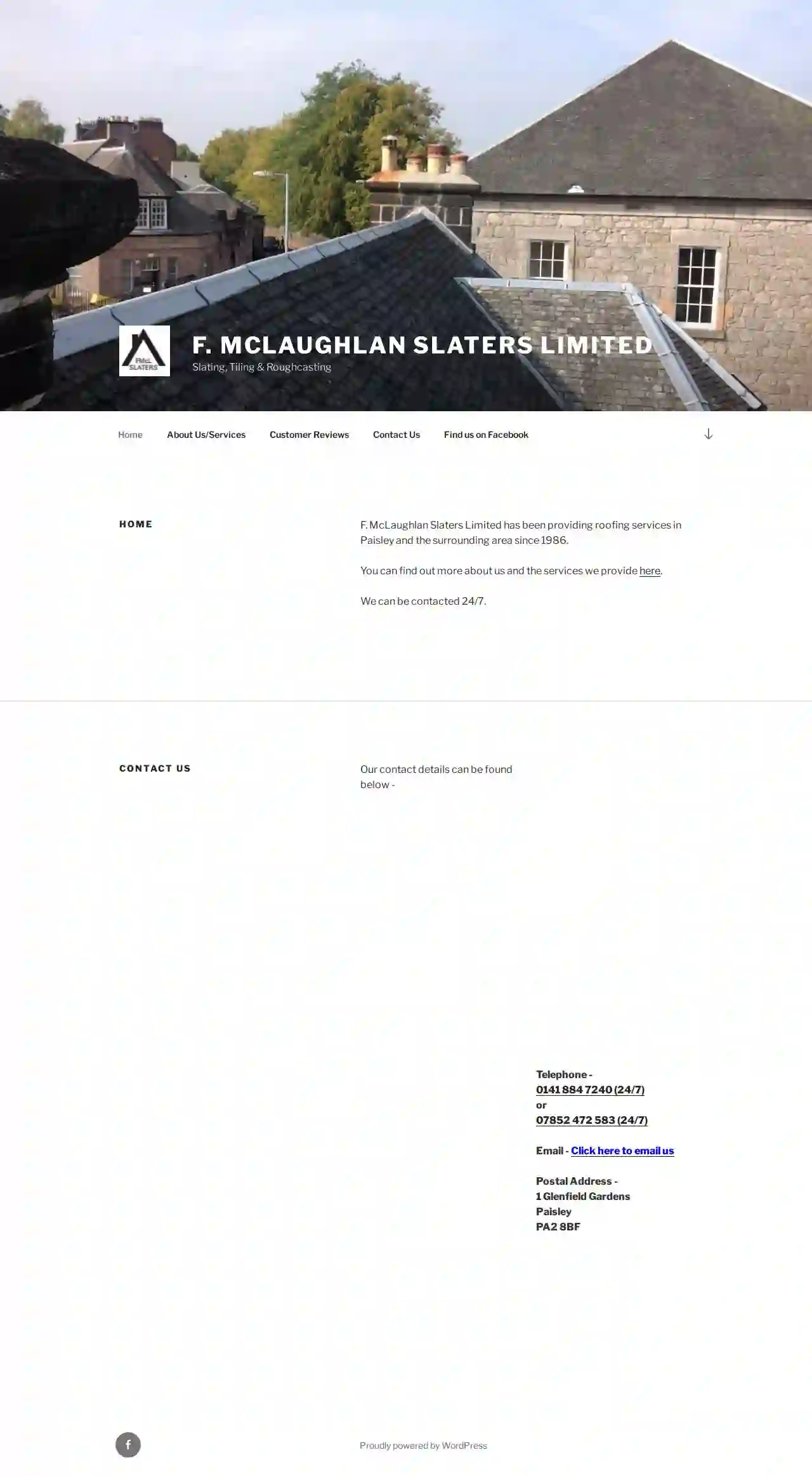
F McLaughlan Slaters Ltd
512 reviews1 Glenfield Gardens, Paisley, PA2 8BF, GBF. McLaughlan Slaters Limited has been providing roofing services in Paisley and the surrounding area since 1986. You can find out more about us and the services we provide here. We can be contacted 24/7.
- Services
- Why Us?
- Gallery
Get Quote
Over 12,314+ Roofers onboarded
Our roofing experts operate in Barrhead and surrounding areas!
Roofyng.co.uk has curated and vetted Top Roofing Businesses near Barrhead. Find a trustworthy contractor today.
Frequently Asked Questions About Roofing Companies
- Hot Climates: Opt for light-colored or reflective roofing materials to reduce heat absorption. Consider tile roofs for their thermal mass and heat resistance.
- Cold Climates: Ensure your roof has adequate insulation and ventilation to prevent ice dams and moisture buildup. Metal roofs can shed snow effectively.
- High-Wind Areas: Choose roofing systems with high wind ratings and properly installed hurricane straps or clips to enhance wind resistance.
- Areas with Heavy Rainfall: Ensure your roof has proper drainage and a waterproof membrane to prevent leaks.
- Experience: Companies with a solid track record and years of experience in the industry.
- Licensing and Insurance: Verify they are properly licensed to operate in your area and carry adequate insurance to protect you from liability.
- Certifications: Look for certifications from reputable organizations, demonstrating expertise in specific roofing materials or techniques.
- Positive Reviews: Check online reviews and testimonials from previous customers.
- Professionalism: Choose a company that communicates clearly, provides detailed estimates, and has a courteous and responsive team.
- Leaks or Water Stains: Water stains on ceilings or walls, dripping water, or dampness in the attic.
- Missing, Cracked, or Curled Shingles: Inspect for damaged or missing shingles, especially after a storm.
- Damaged Flashing: Look for rust, corrosion, or gaps in flashing around chimneys, vents, or skylights.
- Sagging or Uneven Rooflines: A sagging roof could indicate structural problems.
- Granule Loss: Excessive granules in gutters suggest aging asphalt shingles.
- Moss or Algae Growth: Can trap moisture and damage roofing materials.
How do I choose the right type of roof for my climate?
What should I do with my old roof after replacement?
How do I find a good roofing company?
What are some common signs of roof damage?
How do I choose the right type of roof for my climate?
- Hot Climates: Opt for light-colored or reflective roofing materials to reduce heat absorption. Consider tile roofs for their thermal mass and heat resistance.
- Cold Climates: Ensure your roof has adequate insulation and ventilation to prevent ice dams and moisture buildup. Metal roofs can shed snow effectively.
- High-Wind Areas: Choose roofing systems with high wind ratings and properly installed hurricane straps or clips to enhance wind resistance.
- Areas with Heavy Rainfall: Ensure your roof has proper drainage and a waterproof membrane to prevent leaks.
What should I do with my old roof after replacement?
How do I find a good roofing company?
- Experience: Companies with a solid track record and years of experience in the industry.
- Licensing and Insurance: Verify they are properly licensed to operate in your area and carry adequate insurance to protect you from liability.
- Certifications: Look for certifications from reputable organizations, demonstrating expertise in specific roofing materials or techniques.
- Positive Reviews: Check online reviews and testimonials from previous customers.
- Professionalism: Choose a company that communicates clearly, provides detailed estimates, and has a courteous and responsive team.
What are some common signs of roof damage?
- Leaks or Water Stains: Water stains on ceilings or walls, dripping water, or dampness in the attic.
- Missing, Cracked, or Curled Shingles: Inspect for damaged or missing shingles, especially after a storm.
- Damaged Flashing: Look for rust, corrosion, or gaps in flashing around chimneys, vents, or skylights.
- Sagging or Uneven Rooflines: A sagging roof could indicate structural problems.
- Granule Loss: Excessive granules in gutters suggest aging asphalt shingles.
- Moss or Algae Growth: Can trap moisture and damage roofing materials.